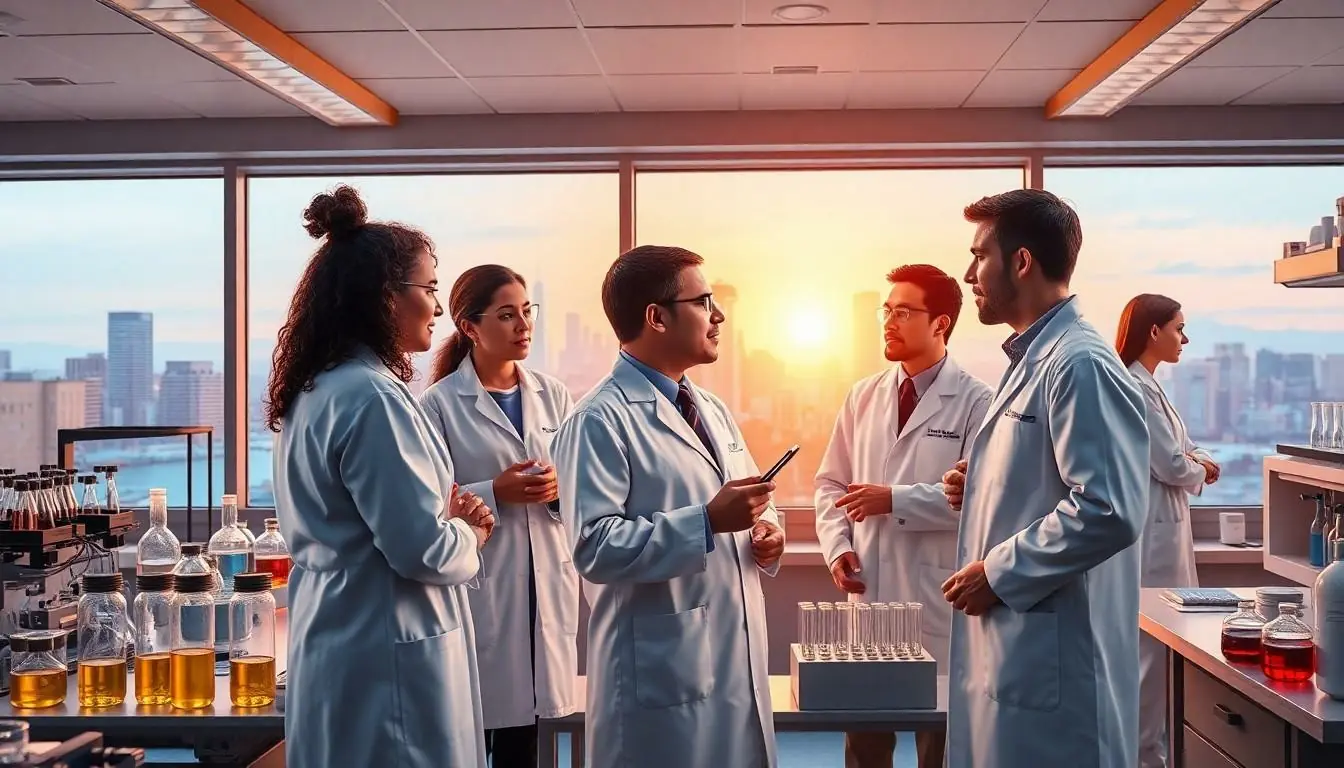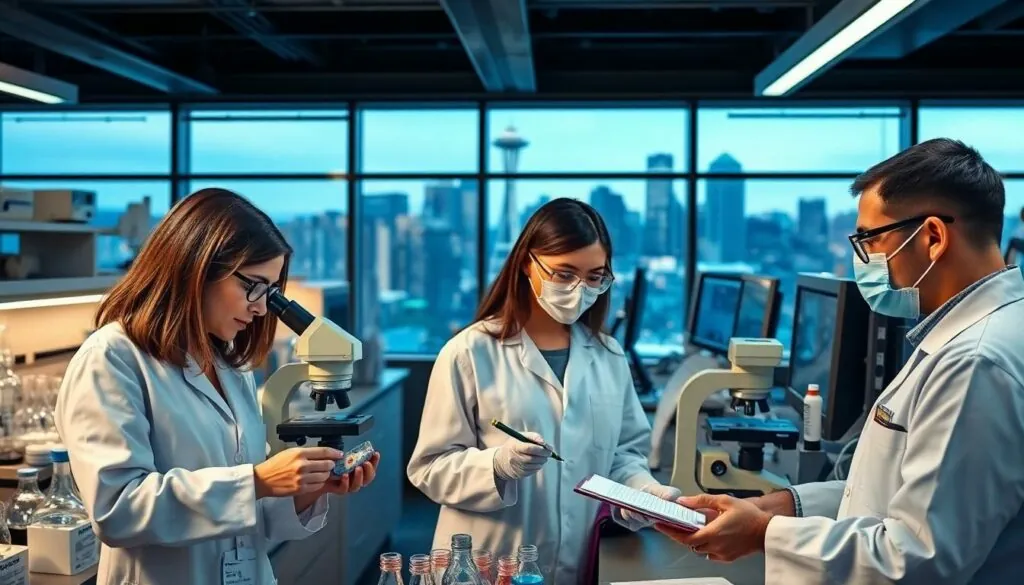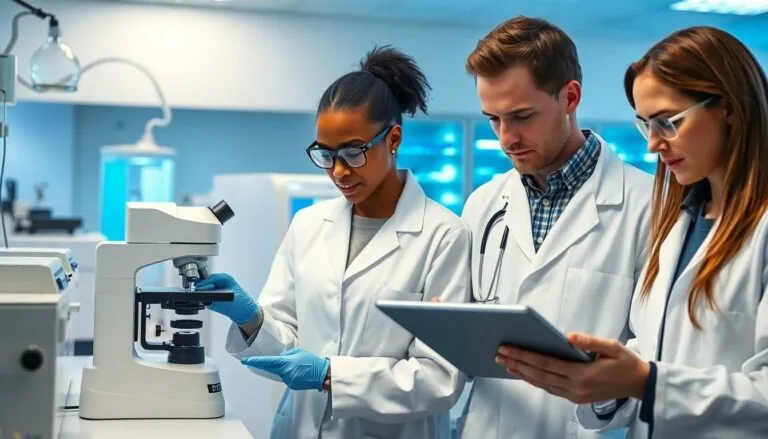Table of Contents
ToggleSeattle’s biotech scene is buzzing like a caffeinated lab rat, and it’s not just the coffee fueling this innovation. Nestled in the Pacific Northwest, this city has become a hotspot for groundbreaking research and development, attracting talent from all corners of the globe. With its unique blend of tech-savvy minds and a passion for life sciences, Seattle is turning wild ideas into life-changing solutions faster than you can say “genetic engineering.”
Overview of Seattle Biotech
Seattle’s biotech sector ranks among the most advanced in the United States. With over 1,100 biotech companies, the city serves as a hub for innovation in life sciences. This vibrant landscape is enriched by collaboration among academic institutions, research organizations, and startups.
Strong support from local universities, such as the University of Washington, drives research efforts. These institutions often partner with biotech firms to advance discoveries in genomics, therapeutics, and diagnostics. Significant developments in CAR T-cell therapy and regenerative medicine illustrate the city’s commitment to pioneering treatments.
A wealth of venture capital fuels growth in the industry. In 2022 alone, Seattle biotech firms secured approximately $2.3 billion in investment. This influx of funding enables startups to navigate initial challenges and transition innovative concepts into market-ready solutions.
Diverse talent within the region enhances potential for breakthroughs. Many professionals, hailing from various scientific disciplines, contribute unique perspectives. This diversity fosters a culture of innovation that thrives on shared knowledge and cross-disciplinary collaboration.
Proximity to major healthcare systems establishes a supportive ecosystem for clinical trials. Access to patient populations helps expedite the development and validation of new therapies. Robust regulatory support streamlines the process of bringing products to market.
Seattle’s biotech sector exemplifies a dynamic interplay of research, investment, and talent, positioning the city as a leader in the life sciences. The continuous evolution of this landscape promises significant contributions to global health advancements.
Key Players in Seattle Biotech

Seattle hosts a dynamic ecosystem of biotech companies and innovative startups. The city’s landscape features influential players driving advancements in life sciences.
Major Companies
Leading organizations shape Seattle’s biotech environment. Amgen, a global biopharmaceutical company, emphasizes drug discovery and development. Juno Therapeutics specializes in CAR T-cell therapies, making significant strides in cancer treatment. Seattle Genetics, known for its innovative antibody-drug conjugates, focuses on targeted therapies. These companies, along with others, contribute to the region’s reputation for excellence in biotechnology.
Startups and Innovations
A range of startups propels Seattle’s biotech innovation. Vaxart develops oral vaccines, utilizing advanced technology to address infectious diseases. Recursion Pharmaceuticals combines AI with biotech to accelerate drug discovery. Sana Biotechnology focuses on gene editing and cell therapy, making notable progress in regenerative medicine. Each startup adds unique perspectives and capabilities, reinforcing Seattle’s role as a hub for groundbreaking advancements in health solutions.
Research and Development Landscape
Seattle’s research and development landscape thrives on collaboration and access to resources. A blend of innovation, academia, and industry fuels this dynamic environment.
Academic Institutions
Major academic institutions play a pivotal role in Seattle’s biotech scene. The University of Washington stands out as a leader in research output, contributing to breakthroughs in various life sciences fields. Renowned for its research facilities, the university hosts over 55 research centers and institutes focused on topics ranging from genomics to bioengineering. Faculty members often collaborate with biotech firms, fostering knowledge transfer and creating opportunities for students to engage in hands-on projects. Such collaborations enrich the educational experience and generate solutions addressing pressing health challenges.
Collaborative Partnerships
Partnerships between biotech companies and research organizations significantly strengthen Seattle’s biotech landscape. Companies often partner with local institutions, enabling access to cutting-edge facilities and expertise. Joint ventures between established firms and emerging startups accelerate innovation by promoting resource sharing and risk management. Collaborative efforts lead to the rapid development of novel therapies and technologies. For example, several firms work closely with Fred Hutchinson Cancer Research Center to advance cancer treatments. These strategic alliances solidify Seattle’s position as a hub for life sciences, ensuring continued growth and groundbreaking discoveries.
Investment Climate
Seattle’s biotech sector thrives on a robust investment climate that fuels innovation and growth. The combination of strong funding sources and significant economic impact creates a dynamic environment for companies in this field.
Funding Sources
Venture capital plays a pivotal role in Seattle’s biotech scene, with firms securing about $2.3 billion in 2022. This capital provides essential resources for startups to bring innovative concepts to market. Angel investors complement this landscape by offering early-stage funding to promising companies. Public and private grants also support research initiatives, enabling projects that tackle pressing health challenges. Additionally, collaborations with local universities, like the University of Washington, enhance funding opportunities through research initiatives. Overall, these funding sources contribute to a climate ripe for advancements in life sciences.
Economic Impact
The biotech industry significantly contributes to Seattle’s economy, creating thousands of jobs across various sectors. In recent years, growth in this field has contributed billions to the local economy, supporting functions from research to commercialization. Job creation in biotech fosters a skilled workforce and promotes local economic development. Moreover, partnerships between biotech firms and healthcare providers enhance the region’s health systems, impacting patient care and outcomes. Increased funding and innovative breakthroughs position Seattle as a leader in life sciences, reinforcing its economic prospects while addressing global health needs.
Future Trends in Seattle Biotech
Emerging technologies continue to reshape Seattle’s biotech landscape. Innovations in artificial intelligence are driving drug discovery processes, allowing companies to identify potential treatments faster and with greater accuracy. The integration of AI tools aims to revolutionize how researchers analyze complex biological data.
Companies are increasingly focusing on personalized medicine. Tailored therapies enhance treatment effectiveness based on an individual’s genetic makeup. This trend signifies a shift toward more targeted approaches in patient care industries.
Gene editing technology, particularly CRISPR, plays a critical role in future advancements. Researchers are exploring its potential applications in treating genetic disorders, cancers, and other conditions. Anticipated breakthroughs could lead to transformative therapies that fundamentally change patient treatment protocols.
Sustainable biotech practices are gaining traction within the sector. Companies emphasize environmentally friendly processes in drug development and production. Developing sustainable solutions aligns with global health initiatives and mitigates environmental impacts.
Collaboration between academia and industry promises to advance research initiatives. Partnerships among universities, research centers, and biotech startups encourage information exchange and resource sharing. This collaborative environment enhances the overall innovation ecosystem, driving projects that meet urgent health challenges.
Investments in digital health technologies also show promise. Tracking health data through wearables allows for continuous monitoring and personalized care. Such advancements could improve patient outcomes in real time, aligning healthcare delivery with individual needs.
Overall, Seattle’s biotech sector stands at the forefront of numerous advancements. The convergence of technology, personalized medicine, and sustainable practices ensures ongoing innovation. As these trends continue to flourish, Seattle maintains its status as a leading hub for life sciences.
Seattle’s biotech ecosystem is a powerhouse of innovation and collaboration. With its strong support from local universities and a wealth of venture capital, the city is poised for continued growth and breakthroughs in life sciences. The focus on personalized medicine and emerging technologies like AI and gene editing highlights the region’s commitment to addressing complex health challenges.
As major companies and startups alike drive advancements in drug discovery and therapies, Seattle’s reputation as a leading biotech hub is solidified. The synergy between academia and industry fosters a dynamic environment that not only enhances patient care but also contributes significantly to the local economy. The future looks bright for Seattle’s biotech sector, promising transformative solutions that will shape healthcare for years to come.







